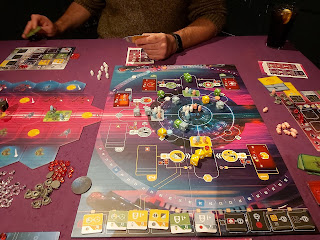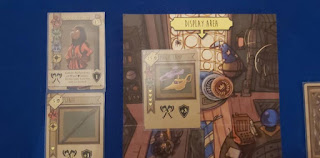Designed by the same guys that brought you the 2010 Euro game Troyes, the game borrows the core mechanics from that game, tacks on a bunch of extra things, twists a few others and spins the theme from the middle ages of Earth into the far future of spaaaacccce. Which is a rubbish description if you have no clue what Troyes is. Suffice to say, some people regard Troyes as the Best Game Ever, and so Black Angel comes with a certain amount of hype, glee and disappointment depending where you stand on Troyes.
Set onboard a sleeper colony starship that is safeguarding the last remnants of humanity - The Black Angel - the players take the role of overseeing AIs that are looking after the ship on its hazardous journey towards a planet called Spes ( pronounced confusingly "space", from the Roman god of hope ). Along the way you get to send your robots off to do various tasks around the ship and also explore the passing systems to fulfill abstract "missions" for various rewards. But as an AI governing your small army of robots, it's not all about sweeping the floors and flying around in your swanky scout ships, the Black Angel is under attack from an unrelenting alien species, the Ravagers ( *cough* Reavers *cough* you cant take the sky from me ! ), who are intent on destroying you, your robots, and your sleeping cryo colonists by turning you into tiny pieces of space debris. At which point everyone loses.
A semi co-operative ?! I can see how you'd think that, but actually no. Despite the game having a built in antagonist who can trash the ship and end with you all "losing", you still compare points - albeit much reduced - and see who the best loser was. In other words, it doesn't really matter at all and is not semi co-operative.
The game is strikingly colourful, with hot pinks and electric neon colours decorating space in something that's very far removed from your typical space trope of black and blue. The artist responsible for the design agreed to do the artwork but on one condition - they didn't want to do Yet Another Space Game that had a massive black backdrop with a few points of colour. Which is understandable but liable to upset some space purists out there. I can't remember the last NASA shot of space that was quite so... pink.
 |
| Space - a lot more Hot Pink than you might have guessed |
There are arguably three main core mechanics to Black Angel. The first is that your actions are tied to the dice you roll. This is one of those, workers are dice, and you stick the dice on an action space kind of a game. This bit of the game is very close to Troyes in that each player has their own pool of differently coloured dice, there's a possibility of not only using your dice, but taking others dice, and you stick those dice down into action slots to perform an action. The Black Angel has six actions you can take, two each in three colours, and it is these you can place your colour matching dice into to activate them.
 |
| End game player tableau. Look at all those black bonus tiles ! Ridiculous ! |
The third main mechanic of the game is within the ever scrolling space exploration board. Here you can move your little robot scout ships out from the Black Angel to place missions on nearby systems. These missions either form a new action space for you to place dice on in addition to the six available onboard The Black Angel, or form bonus tiles that will trigger when they "fall off" the back end of the board. The space board continually refreshes, losing its rearmost set of hexes, and adding a new set of hexes at the front, pushing the Black Angel on towards its destination - and possibly triggering "ejection" missions.
 |
| The main Black Angel player board |
Stripping the game down to its essentials, what you'll basically be doing in this game is trying to get some favourable missions to nearby systems, planning what actions you want to put in your tableau, having one eye on what scoring tiles you can pick up and in order to do all those things running your robots around the ship.
Enough of brass tacks. How does it play ? The game has a good number of moving parts to it which at first glance is tricky to wrap your head around. It's critical that you get out into space and place some missions down - these do you two things, earn you points and materials, but crucially when they are ejected, set you up to possibly allow you to score more points from your bonus tiles. The sheer variety of these missions is pretty much impossible to track unless you've played the game a lot - there are 60 of them, all with different costs and rewards. This is further complicated by the division of the entire game into three different colours - each colour can only be activated by the matching colour, bonuses will only stack on the same colour and so on. Meaning that you kind of have to track three separate states - how are my yellows doing, how are my blues doing, how are my greens doing, am I concentrating on blues, how many dice of that colour do I have ? Getting any bit of that wrong can lead you into awkward situations of not having much useful to do or doing something you probably don't care so much about. Painting yourself into a corner here where you've inadvertently screwed yourself over by either not having the right colour dice available or the right colour card is a real possibility and takes a bit of planning to avoid.
To do the oh so important space exploration malarkey, you're gonna quickly need to get some kind of robot and spaceship availability production going, otherwise you will be faced with having no robots or ships to go explore with. This is also something you're gonna need to keep track of, not only for this turn, but probably a few turns out. And to do that, you'll need to be aware of what cards you're burning to activate your tableau - and whether you've now run out of a colour and maybe need to trigger a dice to get some of those cards back... but that also requires you to have timed the action of that dice so you can properly use it.. and.... oook. If you get any of those things wrong, you're back to the whole I've painted myself into a corner issue again.
One comment from the game on Monday halfway through the playthrough was "I don't think I'm clever enough for this game", and as you invariably cock something up in a screeching car crash of inefficiency at some point it maybe can feel a bit like a car ride where you're only somewhat in control of where you are careening. Everything in the game is interconnected, and pushing at something in one place can take away from something else in another area, possibly not to your overall benefit.
This general feeling of moving parts is also not helped by an absolute wall of iconography everywhere. Which makes it nicely language independent. But also raises a new hurdle of everyone having to understand the sci fi themed hieroglyphics plastered to missions, actions, tech and even the assaulting aliens.
Don't get me wrong. You can certainly play this game. No problem. Playing this game *well* however is another matter. And you'll know that you're not playing it well. It'll tell you. When you end up not being able to perform that action for lack of something. When your tempo is all over the place and you end up wasting cards.
Fortunately the game isn't anywhere near half as crunchy as it seems once you've learned how the game ticks along, and after you've played it once, the game is straight forward enough. Under a sit down and play this game for the first time kind of metric, I'd rate this game as a pretty unfriendly experience - depending on who you are this might put you off, or you might just be intrigued with the cool theme and interlocking actions. A combination of keeping track of states of your colours, your player tableau, dice, the chicken and egg nature of a lot of those factors, a bit of upkeep pain, a wide variety in missions and their points rewards and a wall of hieroglyhpics all add up to a bit of a beginner fog settling over the board.
After all that, overall the game is very nice, has a lot of different things to think about and has bags of replayability hiding within its broad set of interlocking mechanics. The theme is enjoyable if you like your sci fi stuffs and the ever moving space board is something pretty fun and unusual and ties in a beautiful way to track the game timer and is thematically very strong. There is a very fine balance in determining whether a mission card is worth it or not - the game is incredibly short action wise, you'll probably get something in the region of 15 ish actions before the game finishes, which means every action really does count. Something that is entirely not obvious on your first game. The game definitely has an edge of allowing you to happily do stuff that is appallingly bad for your end game, but it feels like you're achieving something Euro style. The game has numerous of these "Euro pit traps", be wary of blindly applying your expert Euro skills over to this game. The tip here is to stay very focused on what earns you points, and how many actions it takes to achieve those points. Laying down a pointless mission or two, or spamming for dice - or spamming for anything - is going to cost you.
The game is very much Troyes 2.0 Electric Boogaloo in my humble opinion, where the core mechanics of Troyes have been taken lock stock and transplanted into a sci fi theme, but with more bits on the end to increase complexity and in a move that feels like someone has sat down and said I like Troyes but how can we make it More. Some reviewers say the games are very different - I'd disagree, even to the point that the transplanted different colour dice from Troyes don't make a hell of a lot of sense in Black Angel. Whilst in Troyes thematically the dice are very seperate spheres of actions ( Red - Military, White - Religious, Yellow - Civil ), in Black Angel that thematic and actual action separation is gone, they are just abstract different colours for the sake of it. It feels super arbitrary and needlessly fussy in places. Of course it's a key part of the game, with everything divided into three colours, but to me it feels like the result of transplanting Troyes directly over without considering whether a modified design would actually fit better and make for a more streamlined elegant game without losing any of the breadth of strategic options available.
Nevertheless a great game when you get to it and have learned how to gauge its heart. But those with a nervous disposition and fans of lighter fare will probably want to stay away.


























